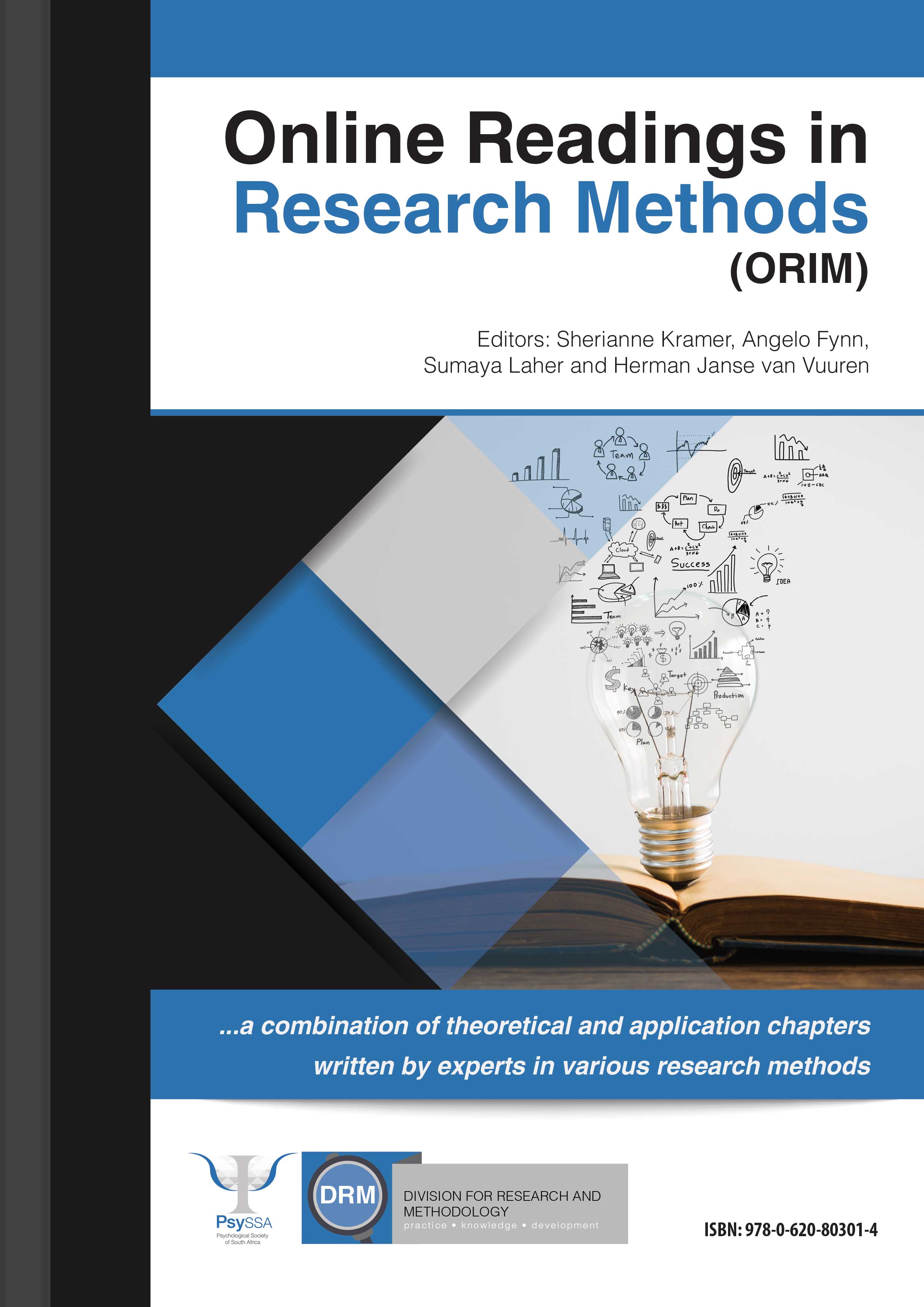
Online Readings in Research Methods (ORIM)
ORIM is a peer reviewed, open access applied research methods text published under the auspices of the Division for Research Methods at the Psychological Society of South Africa (PsySSA). The chapters in ORIM are conceptualised as a combination of theoretical and application chapters written by experts in various research methods. Application chapters incorporate original research to illustrate the use of research methods in novel contexts.

About Online Readings in Research Methods (ORIM)
The project was started by a group of African-based academics who hold the strong belief that knowledge should be freely shared and that paywalls create unfair barriers to knowledge, particularly among those who played a role in its creation. Research methods textbooks, journal articles and monographs are typically costly with access restricted to those who can afford the subscription or authorship fees. We created this text with the aim of widening access to knowledge and disseminating rigorously peer reviewed works at no cost. Further, this exchange of knowledge has the potential to facilitate the development of novel techniques built on untapped systems of knowledge from developing contexts. Authors are not charged any submission, page or publication fees to publish a manuscript with ORIM .
Editorial Team
Editors
Dr Sherianne Kramer, University of Amsterdam
 Sherianne Kramer is a social science researcher and lecturer at the Amsterdam University College and the Amsterdam Council on International Educational Exchange. Her research interests include critical psychology; crime and violence; female and child perpetrated physical and sexual transgression; male victimhood; and gender and sexual identity and performativity. Sherianne chaired the Psychological Society of South Africa Division for Research and Methodology between 2015 and 2017 and is an associate editor for the Journal of Social and Political Psychology.
Sherianne Kramer is a social science researcher and lecturer at the Amsterdam University College and the Amsterdam Council on International Educational Exchange. Her research interests include critical psychology; crime and violence; female and child perpetrated physical and sexual transgression; male victimhood; and gender and sexual identity and performativity. Sherianne chaired the Psychological Society of South Africa Division for Research and Methodology between 2015 and 2017 and is an associate editor for the Journal of Social and Political Psychology.
Professor Sumaya Laher, University of the Witwatersrand
 Sumaya Laher is an Associate Professor in Psychology at the University of the Witwatersrand. She serves as the Immediate Past President of the Psychological Society of South Africa. Sumaya is the Editor of the African Journal of Psychological Assessment and Associate Editor for the South African Journal of Psychology. She has published extensively in the areas of psychological assessment, culture and mental health.
Sumaya Laher is an Associate Professor in Psychology at the University of the Witwatersrand. She serves as the Immediate Past President of the Psychological Society of South Africa. Sumaya is the Editor of the African Journal of Psychological Assessment and Associate Editor for the South African Journal of Psychology. She has published extensively in the areas of psychological assessment, culture and mental health.
Dr Angelo Fynn, University of South Africa
 Angelo Fynn is a Specialist Institutional Researcher at the University of South Africa. His research interests include student success at South African HEI’s; the application of learning analytics within the South African context; Educational Neuroscience; Critical psychology; and the ethics of using big data in the African context. Angelo served as the Deputy Chair for the Psychological Society of South Africa Division for Research and Methodology between 2015 and 2017. He has also assisted the editorial team for the New Voices in Psychology journal and assists with the biennial Southern African Psychology Students conferences.
Angelo Fynn is a Specialist Institutional Researcher at the University of South Africa. His research interests include student success at South African HEI’s; the application of learning analytics within the South African context; Educational Neuroscience; Critical psychology; and the ethics of using big data in the African context. Angelo served as the Deputy Chair for the Psychological Society of South Africa Division for Research and Methodology between 2015 and 2017. He has also assisted the editorial team for the New Voices in Psychology journal and assists with the biennial Southern African Psychology Students conferences.
Editorial Assistant
Mr Herman Janse Van Vuuren, University of Zululand
 Hermanus Janse van Vuuren is a quality advisor and analyst in the Directorate of Institutional Planning at the University of Zululand. He is currently pursuing a PhD through University of South Africa, with a focus on the relationships between Masters and Doctoral students and their research supervisors. His research interests include student support in Higher Education, and postgraduate student supervision.
Hermanus Janse van Vuuren is a quality advisor and analyst in the Directorate of Institutional Planning at the University of Zululand. He is currently pursuing a PhD through University of South Africa, with a focus on the relationships between Masters and Doctoral students and their research supervisors. His research interests include student support in Higher Education, and postgraduate student supervision.
Acknowledgements
We are also greatly indebted to many people, who selflessly agreed to review a chapter, purely as an exercise in academic citizenship and as a contribution to a high standard of academic knowledge. We have listed their names below:
- Professor Pieter Kruger, North-West University
- Professor Jeannette Maritz, University of South Africa
- Professor Garth Stevens, University of the Witwatersrand
- Professor Brett Bowman, University of the Witwatersrand
- Dr. Malose Makhubela, University of Pretoria
- Dr. Nicoleen Coetzee, University of Pretoria
- Dr. Lynlee Howard-Payne, University of the Witwatersrand and Western Sydney University
- Ms. Lynn Hendricks, Stellenbosch University
- Ms. Saloshni Muthal, University of the Witwatersrand
- Prof. George Angelopulo, University of South Africa
Open Access principles
All work published within this body of work is licenced under a Creative Commons Attribution-Noncommercial-No Derivative Works 4.0. Under this licence you are free to share, copy and redistribute the material in any medium or format with the following conditions:
- Attribution – Always give appropriate credit, give the link to the licence, and indicate any changes made;
- Non-commercial – You may not use the material for commercial purposes;
- No Derivatives – If you remix, transform, alter or build on the material, you may not distribute the modified material;
- No additional restrictions – You may not apply legal or technological measures that restrict others from doing what the licence permits; and
Authors are not charged any submission, page or publication fees to publish a manuscript with ORIM .
Author Guidelines and Submission Instructions
Chapters must be submitted via email to editor@socialsciencemethods.co.za. All submissions are peer reviewed by two experts in the field. ORIM employs a blind peer reviewing system.
Chapter Structure
- Each chapter should begin with an introduction that provides the context to the method. This is to be followed by an outline of what the chapter will cover.
- Chapters should attempt to be a critical examination of the utility of the method in a South African, African and/or Global South context.
- Authors are requested to avoid limiting their information to sources from western, mainstream material and sources. It is possible that inconsistencies exist in terms of the method and its application across other contexts other than those mentioned above. These should also be discussed wherever applicable.
- It is important that each chapter consider ethical issues relating to the research and/or the method. Most importantly, the elements of the research that relate to ethics need to be clearly illustrated through references to collaborative partnership, social value, social justice, scientific validity, informed consent, fair selection, favourable risk-benefit ratio, independent ethical review, and ongoing respect for participants and study communities where appropriate.
- Each chapter is also required to have a concluding section that summarises the arguments made and provides some discussion on future developments for the method or technique, especially as these pertain to Global South and African issues.
- Authors are expected to write at a level understandable to end level undergraduate and postgraduate students and professionals with an interest in research methods.
- As with any multi-authored text, we expect the writing style to vary across chapters, and even within chapters. For this reason, we are reserving the right to edit the chapters for consistency in tone and style.
- Brief biographies (approximately 200 words) for each author on a chapter must be provided. Authors are also encouraged to provide their ORCiD identities, Researchgate and Google Scholar links to increase the visibility of their work.
- Each chapter is to be between 5000-8000 words (including notes and references, approx. 20 -25 pages).
- Chapters should use Times New Roman, size 12 font and 1.5 line spacing.
- Articles submitted to ORIM must make use of the American Psychological Association (APA) 6th Edition guidelines for in-text references and for reference lists.
There are no page fees or publication costs. All accepted chapters will be published online and will be open access.
Citation Format
{Author/s}. ({year}). {Title}. In S. Kramer, S. Laher, A. Fynn, & H. H. Janse van Vuuren (Eds.), Online Readings in Research Methods (ORIM). (Chapter number). Psychological Society of South Africa: Johannesburg. https://doi.org/10.17605/OSF.IO/BNPFS
Example:
Khumalo, I. P., & de Klerk, W. (2018). Ethical psychological research and community engagement in a South African Context. In S. Kramer, S. Laher, A. Fynn, & H. H. Janse van Vuuren (Eds.), Online Readings in Research Methods (ORIM) (Chapter 4). Psychological Society of South Africa: Johannesburg. https://doi.org/10.17605/OSF.IO/BNPFS
